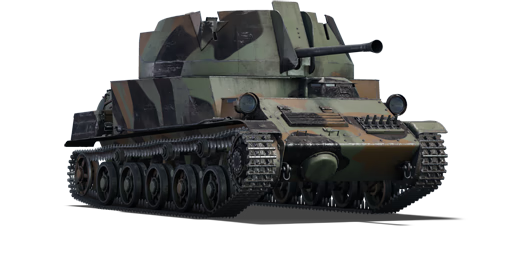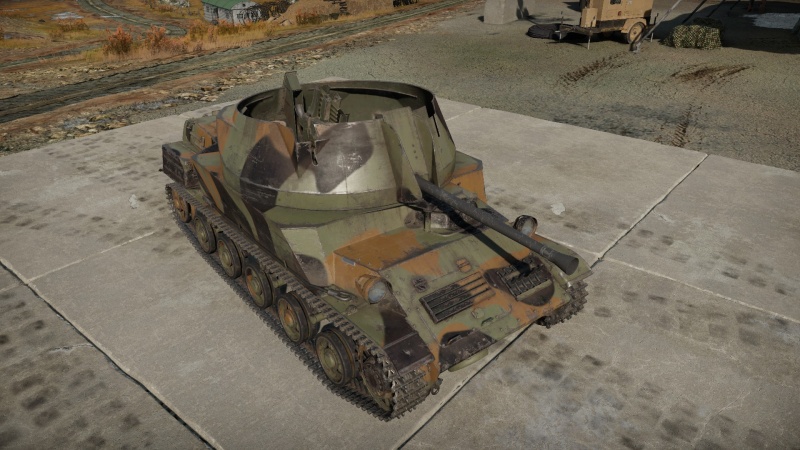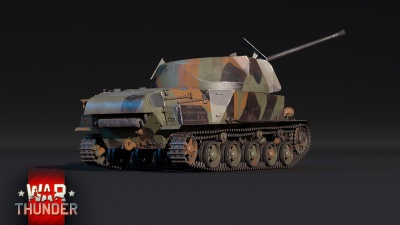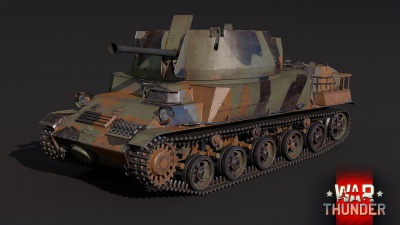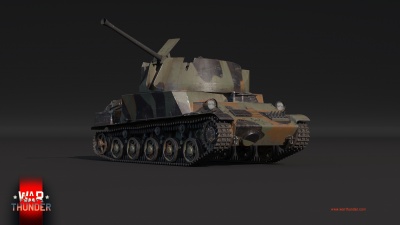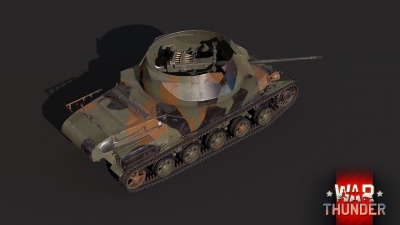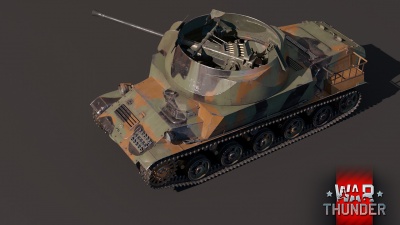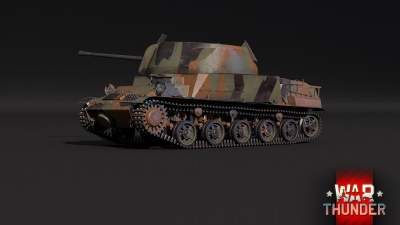Difference between revisions of "L-62 ANTI II"
m (→Pros and cons: I changed it a very effictive to "is") (Tag: Visual edit) |
m (→Description) |
||
| (8 intermediate revisions by 7 users not shown) | |||
| Line 6: | Line 6: | ||
== Description == | == Description == | ||
<!-- ''In the description, the first part should be about the history of the creation and combat usage of the vehicle, as well as its key features. In the second part, tell the reader about the ground vehicle in the game. Insert a screenshot of the vehicle, so that if the novice player does not remember the vehicle by name, he will immediately understand what kind of vehicle the article is talking about.'' --> | <!-- ''In the description, the first part should be about the history of the creation and combat usage of the vehicle, as well as its key features. In the second part, tell the reader about the ground vehicle in the game. Insert a screenshot of the vehicle, so that if the novice player does not remember the vehicle by name, he will immediately understand what kind of vehicle the article is talking about.'' --> | ||
| − | The '''{{Specs|name}}''' | + | The '''{{Specs|name}}''' was an SPAA developed by Landsverk of Sweden. It was based on the Anti I, but with an improved hull and turret and armed with a 40 mm Bofors L/60 anti-aircraft gun. It was based on the chassis of the [[Strv_m/38|Landsverk L-60]], a light tank developed in the interwar period. It saw notable service in the Finnish military, who acquired six units of the SPAA in 1942. It saw combat in the Continuation War when Finland invades the Soviet Union and the vehicles were credited with shooting down 11 Soviet aircraft. All the vehicles survived the war and remained in service until 1966. |
| + | |||
| + | Introduced in [[Update 1.97 "Viking Fury"]], the '''{{Specs|name}}''' is a menace to both air and ground targets. Against aircrafts, the gun features a powerful 40 mm HE shell with potential to destroy most planes with a single hit. Against tanks the performance is not as good, but the APC and SAPHEI shells have enough penetration to deal with most tanks at its BR as long as you aim to weak points. Flanking in this vehicle is highly recommended, as well as staying behind the frontline to clear up the skies. However for some players the vehicle may feel a little sluggish and the gun handling is not very good with just -5 degrees of depression. It also has a slow fire rate, at 120 RPM, and the armor is nonexistent so both HE and HEAT shells are a threat since the vehicle is open top. | ||
== General info == | == General info == | ||
=== Survivability and armour === | === Survivability and armour === | ||
{{Specs-Tank-Armour}} | {{Specs-Tank-Armour}} | ||
| − | ''Describe armour protection. Note the most well protected and key weak areas. Appreciate the layout of modules as well as the number and location of crew members. Is the level of armour protection sufficient, is the placement of modules helpful for survival in combat? If necessary use a visual template to indicate the most secure and weak zones of the armour.'' | + | <!-- ''Describe armour protection. Note the most well protected and key weak areas. Appreciate the layout of modules as well as the number and location of crew members. Is the level of armour protection sufficient, is the placement of modules helpful for survival in combat? If necessary use a visual template to indicate the most secure and weak zones of the armour.'' --> |
| − | + | When one looks at the L-62 ANTI II, it's expected to have decent protection, when in reality it's armoured like the reserve tank [[Strv m/38]]. As such, its hull and the turret will only sustain rifle-calibre MG. | |
| − | When one looks at the | ||
The gun shield is expected to protect the crew in case of a brawl with a light tank, but it's only 8 mm thick and can be penetrated by anything at point blank range. It's also way too small to protect the SPAA from any aircraft. | The gun shield is expected to protect the crew in case of a brawl with a light tank, but it's only 8 mm thick and can be penetrated by anything at point blank range. It's also way too small to protect the SPAA from any aircraft. | ||
| Line 21: | Line 22: | ||
Compared to the Lvtdgb m/40, technically the protection is supposed to be better, but in reality it just provokes tanks to fire APHE or HE at it, immediately destroying the tank. There is also no longer a possibility to just face them with the front and to lay suppressive fire, expecting the driver cab to stop incoming attacks - the whole interior is now interconnected. But it may protect from MG in RB/SB due to the SPAA's lower BR there. | Compared to the Lvtdgb m/40, technically the protection is supposed to be better, but in reality it just provokes tanks to fire APHE or HE at it, immediately destroying the tank. There is also no longer a possibility to just face them with the front and to lay suppressive fire, expecting the driver cab to stop incoming attacks - the whole interior is now interconnected. But it may protect from MG in RB/SB due to the SPAA's lower BR there. | ||
| − | Technically, it's difficult to notice the {{PAGENAME}} as it's not a truck and looks like a tank from afar, so in RB/SB it can pass as something less dangerous to aircraft and faraway tanks until it starts to fire. In AB, | + | Technically, it's difficult to notice the {{PAGENAME}} as it's not a truck and looks like a tank from afar, so in RB/SB it can pass as something less dangerous to aircraft and faraway tanks until it starts to fire. In AB, its class will immediately alert everyone of what it actually does and every aircraft will immediately go after it. |
'''Armour type:''' <!-- The types of armour present on the vehicle and their general locations --> | '''Armour type:''' <!-- The types of armour present on the vehicle and their general locations --> | ||
| Line 84: | Line 85: | ||
* '''slhpgr m/43:''' {{Annotation|SAPHEI|Semi armour-piercing high-explosive incendiary}}{{-}}{{Annotation|SAPHEI|Semi armour-piercing high-explosive incendiary}}{{-}}{{Annotation|SAPHEI|Semi armour-piercing high-explosive incendiary}}{{-}}{{Annotation|HEFI-T|High-explosive fragmentation incendiary tracer}} | * '''slhpgr m/43:''' {{Annotation|SAPHEI|Semi armour-piercing high-explosive incendiary}}{{-}}{{Annotation|SAPHEI|Semi armour-piercing high-explosive incendiary}}{{-}}{{Annotation|SAPHEI|Semi armour-piercing high-explosive incendiary}}{{-}}{{Annotation|HEFI-T|High-explosive fragmentation incendiary tracer}} | ||
| − | { | + | {{:lvakan m/36 (40 mm)/Ammunition|APC, HEFI-T, SAPHEI}} |
| − | |||
| − | |||
| − | |||
| − | |||
| − | |- | ||
| − | |||
| − | |||
| − | |||
| − | |||
| − | |||
| − | |||
| − | |||
| − | |||
| − | |||
==== [[Ammo racks]] ==== | ==== [[Ammo racks]] ==== | ||
| Line 152: | Line 139: | ||
Development of the L-62 began in 1931, with the Landsverk company choosing to convert their L-10 light tank into an SPAA unit as part of a plan to create a range of vehicles intended for the export market. During development however, Landsverk created the more advanced L-60 tank, leading to the decision of continuing development of the L-62 on that chassis instead of the previously used L-10. | Development of the L-62 began in 1931, with the Landsverk company choosing to convert their L-10 light tank into an SPAA unit as part of a plan to create a range of vehicles intended for the export market. During development however, Landsverk created the more advanced L-60 tank, leading to the decision of continuing development of the L-62 on that chassis instead of the previously used L-10. | ||
| − | The first prototype of the L-62, named ANTI I, was built by the end of the | + | The first prototype of the L-62, named ANTI I, was built by the end of the 1930s in parallel with the L-60 then tested. While the Swedish military didn't express interest in procuring the L-62, the Hungarian military purchased the production licence for both the L-60 and L-62, resulting in the creation of the domestically produced 38M Toldi and 40M Nimród tanks, respectively. |
| − | Landsverk continued developing the L-62 into the early | + | Landsverk continued developing the L-62 into the early 1940s, creating a more advanced version of the L-62 in 1941, called the ANTI II. The improved version featured a new hull and turret, as well as having its German transmission swapped out for a Swedish one. |
A total of six L-62 ANTI IIs were built, all of which were purchased by Finland and subsequently used in action throughout the remainder of WWII. Surviving the war, the L-62s were used as training vehicles in the postwar period and right up until their retirement in 1966. | A total of six L-62 ANTI IIs were built, all of which were purchased by Finland and subsequently used in action throughout the remainder of WWII. Surviving the war, the L-62s were used as training vehicles in the postwar period and right up until their retirement in 1966. | ||
| Line 176: | Line 163: | ||
== See also == | == See also == | ||
| − | + | Vehicles of similar configuration and role: | |
| + | |||
| + | * [[Crusader AA Mk I]] | ||
| + | * [[Lvkv 42]] | ||
| + | * [[LVT-4/40]] | ||
| − | * | + | Vehicles with similar weapon systems: |
| − | * | + | |
| + | * [[Lvtdgb m/40]] | ||
| + | * [[CCKW 353 AA]] | ||
== External links == | == External links == | ||
| Line 188: | Line 181: | ||
* [[wt:en/news/6624-development-l-62-anti-ii-finnish-choice-en|[Devblog] L-62 ANTI II: Finnish Choice]] | * [[wt:en/news/6624-development-l-62-anti-ii-finnish-choice-en|[Devblog] L-62 ANTI II: Finnish Choice]] | ||
| − | === | + | === References === |
| + | |||
| + | ;Bibliography | ||
* Landsverk L-62 Anti-II. (2019, October 20). In ''Wikipedia.'' https://en.wikipedia.org/w/index.php?title=Landsverk_L-62_Anti_II&oldid=922225342 | * Landsverk L-62 Anti-II. (2019, October 20). In ''Wikipedia.'' https://en.wikipedia.org/w/index.php?title=Landsverk_L-62_Anti_II&oldid=922225342 | ||
| + | {{TankManufacturer AB Landsverk}} | ||
{{Sweden anti-aircraft vehicles}} | {{Sweden anti-aircraft vehicles}} | ||
Latest revision as of 07:35, 14 December 2023
Contents
Description
The Landsverk L-62 ANTI II was an SPAA developed by Landsverk of Sweden. It was based on the Anti I, but with an improved hull and turret and armed with a 40 mm Bofors L/60 anti-aircraft gun. It was based on the chassis of the Landsverk L-60, a light tank developed in the interwar period. It saw notable service in the Finnish military, who acquired six units of the SPAA in 1942. It saw combat in the Continuation War when Finland invades the Soviet Union and the vehicles were credited with shooting down 11 Soviet aircraft. All the vehicles survived the war and remained in service until 1966.
Introduced in Update 1.97 "Viking Fury", the Landsverk L-62 ANTI II is a menace to both air and ground targets. Against aircrafts, the gun features a powerful 40 mm HE shell with potential to destroy most planes with a single hit. Against tanks the performance is not as good, but the APC and SAPHEI shells have enough penetration to deal with most tanks at its BR as long as you aim to weak points. Flanking in this vehicle is highly recommended, as well as staying behind the frontline to clear up the skies. However for some players the vehicle may feel a little sluggish and the gun handling is not very good with just -5 degrees of depression. It also has a slow fire rate, at 120 RPM, and the armor is nonexistent so both HE and HEAT shells are a threat since the vehicle is open top.
General info
Survivability and armour
When one looks at the L-62 ANTI II, it's expected to have decent protection, when in reality it's armoured like the reserve tank Strv m/38. As such, its hull and the turret will only sustain rifle-calibre MG.
The gun shield is expected to protect the crew in case of a brawl with a light tank, but it's only 8 mm thick and can be penetrated by anything at point blank range. It's also way too small to protect the SPAA from any aircraft.
Depending on the BR of opposing tanks, the turret crew armour may protect from enemy tanks, many rank I and II tanks can be too short to fire over it, but most of rank III tanks (which will be the norm in AB, as the L-62 ANTI II belongs to the rank III lineup by default) will not only be too tall for it to matter, but will have HMG that can penetrate it anyway. Regardless, the turret has a lot of openings which allow any tank to decimate the entire turret crew if they try harder. The turret is also way too short and inconsistent to protect from any decent pilot and might as well not exist in case of an air strike.
Compared to the Lvtdgb m/40, technically the protection is supposed to be better, but in reality it just provokes tanks to fire APHE or HE at it, immediately destroying the tank. There is also no longer a possibility to just face them with the front and to lay suppressive fire, expecting the driver cab to stop incoming attacks - the whole interior is now interconnected. But it may protect from MG in RB/SB due to the SPAA's lower BR there.
Technically, it's difficult to notice the L-62 ANTI II as it's not a truck and looks like a tank from afar, so in RB/SB it can pass as something less dangerous to aircraft and faraway tanks until it starts to fire. In AB, its class will immediately alert everyone of what it actually does and every aircraft will immediately go after it.
Armour type:
| Armour | Front (Slope angle) | Sides | Rear | Roof |
|---|---|---|---|---|
| Hull | ___ mm | ___ mm Top ___ mm Bottom |
___ mm | ___ - ___ mm |
| Turret | ___ - ___ mm Turret front ___ mm Gun mantlet |
___ - ___ mm | ___ - ___ mm | ___ - ___ mm |
| Cupola | ___ mm | ___ mm | ___ mm | ___ mm |
Notes:
Mobility
It is effectively slower than the Lvtdgb m/40, but can turn around in place even without neutral steering, which makes it better when fighting inside of a town.
| Game Mode | Max Speed (km/h) | Weight (tons) | Engine power (horsepower) | Power-to-weight ratio (hp/ton) | |||
|---|---|---|---|---|---|---|---|
| Forward | Reverse | Stock | Upgraded | Stock | Upgraded | ||
| Arcade | Expression error: Unexpected * operator. | 205 | Expression error: Unexpected round operator. | __.__ | |||
| Realistic | 127 | Expression error: Unexpected round operator. | __.__ | ||||
Modifications and economy
Armaments
Main armament
The gun and the ammunition are the same as the Lvtdgb m/40. The only noticeable differences are the slightly reduced recoil, the fact that the gun is able to fire straight in any direction and the slower traverse speed, requiring the hull to be turned at the same time to catch up to an enemy.
| 40 mm lvakan m/36 | Turret rotation speed (°/s) | Reloading rate (seconds) | ||||||||||||
|---|---|---|---|---|---|---|---|---|---|---|---|---|---|---|
| Mode | Capacity (Belt) | Fire rate | Vertical | Horizontal | Stabilizer | Stock | Upgraded | Full | Expert | Aced | Stock | Full | Expert | Aced |
| Arcade | 144 (8) | 120 | -5°/+85° | ±180° | N/A | 18.5 | 25.6 | 31.1 | 34.4 | 36.6 | 0.65 | 0.58 | 0.53 | 0.50 |
| Realistic | 12.5 | 14.7 | 17.9 | 19.7 | 21.0 | |||||||||
Ammunition
- Default: APC · HEFI-T
- slsgr m/36C: HEFI-T · HEFI-T · HEFI-T · APC
- slhpgr m/43: SAPHEI · SAPHEI · SAPHEI · HEFI-T
| Penetration statistics | |||||||
|---|---|---|---|---|---|---|---|
| Ammunition | Penetration @ 0° Angle of Attack (mm) | ||||||
| 10 m | 100 m | 500 m | 1,000 m | 1,500 m | 2,000 m | ||
| APC | 79 | 75 | 60 | 46 | 35 | 26 | |
| HEFI-T | 9 | 9 | 8 | 6 | 5 | 4 | |
| SAPHEI | 68 | 64 | 49 | 35 | 25 | 18 | |
| Shell details | ||||||||||||
|---|---|---|---|---|---|---|---|---|---|---|---|---|
| Ammunition | Velocity (m/s) |
Projectile mass (kg) |
Fuse delay (m) |
Fuse sensitivity (mm) |
Explosive mass (TNT equivalent) (g) |
Ricochet | ||||||
| 0% | 50% | 100% | ||||||||||
| APC | 800 | 1.2 | - | - | - | 48° | 63° | 71° | ||||
| HEFI-T | 850 | 1 | 0.1 | 0.1 | 44 | 79° | 80° | 81° | ||||
| SAPHEI | 880 | 1 | 1.2 | 9 | 38 | 79° | 80° | 81° | ||||
Ammo racks
| Full ammo |
1st rack empty |
2nd rack empty |
3rd rack empty |
4th rack empty |
5th rack empty |
6th rack empty |
Visual discrepancy |
|---|---|---|---|---|---|---|---|
| 18 | __ (+__) | __ (+__) | __ (+__) | __ (+__) | __ (+__) | __ (+__) | __ |
Usage in battles
Describe the tactics of playing in the vehicle, the features of using vehicles in the team and advice on tactics. Refrain from creating a "guide" - do not impose a single point of view but instead give the reader food for thought. Describe the most dangerous enemies and give recommendations on fighting them. If necessary, note the specifics of the game in different modes (AB, RB, SB).
Pros and cons
Pros:
- Against aircraft, 40 mm HE is lethal when it hits
- Works as a tank destroyer in RB against rank I-II tanks since it has 60-79 mm penetration
- Stock belt is a very effective all-purpose belt, while SAPHEI belt can destroy tanks and severely damage bombers in one hit
- Almost has no noticeable reload time, allowing it to continuously fire when needed
- Relatively mobile
- Is less prone to alert every aircraft due to not looking like a truck (not relevant in AB)
Cons:
- Bad reverse speed
- Can be destroyed by any explosive ammunition via overpressure due to it being open-topped
- Very ineffective armour that can even be circumvented by anything head-on
- Turret armour does not protect well against strafing aircraft and might as well not exist after a certain height
- Bad turret traverse speeds (both horizontal & vertical)
- Slow rate of fire (120 rpm) and average shell velocity, hitting fast planes is quite hard
- Low fire density, requires more-than-average aiming skills in a head-on
- -5° gun depression is only usable in flat battlefields
History
The Landsverk L-62, also known as the Anti II, was a self propelled anti-aircraft gun designed for Finland in 1941 by Landsverk of Sweden. It was based on the Anti I, but with an improved hull and turret. It was based on the chassis of the Landsverk L-60, a light tank design made in the interwar period. The L-62 had an extra road wheel, compared to the L-60. The turret was open topped, and circular. This allowed for better visibility of planes. It was armed with the 40 mm Bofors L/60 anti-aircraft gun. Finland ordered 6 of these vehicles in 1942, and designated them as the ItPsv 41, or Ilmatorjuntapanssarivaunu 41. This translates to anti-aircraft tank 41 in English. In the Summer of 1944, the ItPsv 41 shot down 11 Soviet planes. This protected the tank brigade from air attack. All 6 vehicles were used in Finnish service until 1966.
Devblog
Development of the L-62 began in 1931, with the Landsverk company choosing to convert their L-10 light tank into an SPAA unit as part of a plan to create a range of vehicles intended for the export market. During development however, Landsverk created the more advanced L-60 tank, leading to the decision of continuing development of the L-62 on that chassis instead of the previously used L-10.
The first prototype of the L-62, named ANTI I, was built by the end of the 1930s in parallel with the L-60 then tested. While the Swedish military didn't express interest in procuring the L-62, the Hungarian military purchased the production licence for both the L-60 and L-62, resulting in the creation of the domestically produced 38M Toldi and 40M Nimród tanks, respectively.
Landsverk continued developing the L-62 into the early 1940s, creating a more advanced version of the L-62 in 1941, called the ANTI II. The improved version featured a new hull and turret, as well as having its German transmission swapped out for a Swedish one.
A total of six L-62 ANTI IIs were built, all of which were purchased by Finland and subsequently used in action throughout the remainder of WWII. Surviving the war, the L-62s were used as training vehicles in the postwar period and right up until their retirement in 1966.
Media
- Skins
- Images
See also
Vehicles of similar configuration and role:
Vehicles with similar weapon systems:
External links
References
- Bibliography
- Landsverk L-62 Anti-II. (2019, October 20). In Wikipedia. https://en.wikipedia.org/w/index.php?title=Landsverk_L-62_Anti_II&oldid=922225342
| AB Landsverk | |
|---|---|
| Light Tanks | |
| L-10 | Strv m/31 |
| L-60 | Strv m/38 · Strv m/39 · Strv m/40L |
| Pbil m/40 | Pbil m/40 |
| Strv 74 | Strv 74 |
| Unimog 404 | U-SH 405 |
| Medium Tanks | |
| Lago | Lago I · Strv m/42 EH · Ikv 73 · Strv m/42 DT |
| Tank Destroyers | |
| Ikv 72 | Ikv 72 · Ikv 103 |
| Pvkv m/43 | Pvkv m/43 (1946) · Pvkv m/43 (1963) |
| Pvkv II/III | Pvkv II · Pvkv III |
| SPAA | Pvlvv fm/42 · L-62 ANTI II |
| Sweden anti-aircraft vehicles | |
|---|---|
| SPAA | Pvlvv fm/42 · Lvtdgb m/40 · Pbv 301 · Lvkv 42 · U-SH 204 GK |
| Radar SPAA | VEAK 40 · Lvkv 9040C |
| SAM | Lvrbv 701 · ASRAD-R |
| Finland | L-62 ANTI II · ▄ZSU-57-2 · ItO 90M · ItPsV Leopard |


